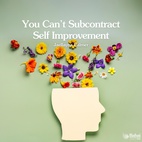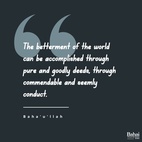The views expressed in our content reflect individual perspectives and do not represent the official views of the Baha'i Faith.
Raising children in a materialistic society can be very difficult for parents, whether or not they have extra income at their disposal.
Parents normally want the best for their children, but deciding what should be included in that category is tough. When we see the extravagances other parents bestow upon their children, we need to also see past the comparisons to decide what will benefit our own children the most. This is one of the most important parts of parenting. While many parents want to provide their children with a better upbringing than they had, this concept should not expand to mean giving children more things.
In trying to incorporate “more” in our own lives, my husband and I start early to instill virtues of independence and charity into our children. We have found that following the Baha’i teachings of accustoming children to hardship to be the most valuable in teaching these vitally important virtues:
Bring them up to work and strive, and accustom them to hardship. Teach them to dedicate their lives to matters of great import, and inspire them to undertake studies that will benefit mankind. – Abdu’l-Baha, Selections from the Writings of Abdu’l-Baha, pp. 128-129.
For us, accustoming our children to hardship provides the fundamental inner building blocks which both cut down on finding satisfaction in the accumulation of more things and prepares them for the reality of human existence. While many children throughout the world do have to live without the basic necessities of shelter, clean water, or food, I am not suggesting that this is the appropriate treatment for any child. Hardship should imply only a situation where a child does not receive what they desire (new toys!) or when a child has responsibilities required of them which their peers might not (chores). These instances teach children how to learn to cope with feelings of desire and understanding of individual responsibility.
The Universal House of Justice embraced this Baha’i principle by stating:
Love demands discipline, the courage to accustom children to hardship, not to indulge their whims or leave them entirely to their own devices. – The Universal House of Justice, Letter to the Baha’i World, April 2000.
As adults, we all practice dealing with hardship within our own lives every day. We struggle to make ends meet, to do our best at work, to overcome our own tests and tribulations. When children understand early in life that they will repeatedly need to find the inner resources to face and conquer life’s hardships, they grow into better, more functional and happy adults. When you accustom them to hardship, they develop the tools to face the inevitable tests and trials they will encounter later in life.
For example: my husband and I travel when we can in an effort to expose our children to different cultures and environments unlike their own. Travel does not have to be extravagant; merely taking children out of their comfort zones and routine is a hardship that produces opportunities for growth. We try and keep birthdays and holidays as basic as possible; don’t get me wrong, we love a party, but gifts are usually from us or grandparents, with a respectful request of our friends not to bring more. Our children are certainly still very much provided for and loved, but at birthdays and holidays we focus on the friendship and the gathering rather than the gifts.
Deciding not to leave children to their own devices does not require a parent to act as a cruise director with a timed daily schedule, but to guide and form them into virtuous human beings. Chores, for example, do not need to be rewarded. They should be expected and required of all. Putting blankets on a bed, feeding a dog, and picking up toys are tasks even the youngest child can perform. We call it being on the “family team” where everyone has to contribute their share to household tasks. Even caring for a sibling is expected in our household; holding a bottle, feeding the baby (when age appropriate), or reading to each other are needed at various times throughout the day. While these tasks might initially seem like a hardship for a child, in the long run they learn to take pride in their work and eventually act preemptively.
From experience, it is difficult to be the bearer of hardship as a parent who only wants what is best for their child. It is heartbreaking sometimes to say no to your child—however, love requires a parent to take it upon themselves to ensure the love is wholehearted and complete. This might mean that you, as a parent, must choose a harder route than necessary to provide these experiences to your child. This might open up discussion you don’t feel comfortable having with your child about peer differences of wealth and/or responsibility, but children need these discussions so they can understand the importance of these factors in their own lives and within society. Children are naturally loving and resilient; when you accustom them to some hardship they will learn independence and responsibility in the long run, and will see only the enormous act of love it took for you to teach them these things.

















Comments
Sign in or create an account
Continue with Facebookor